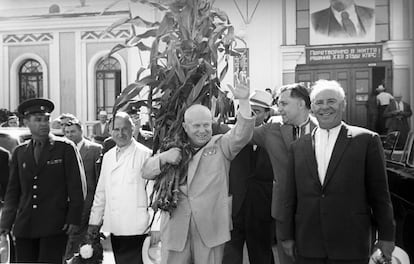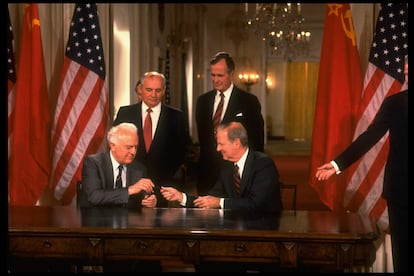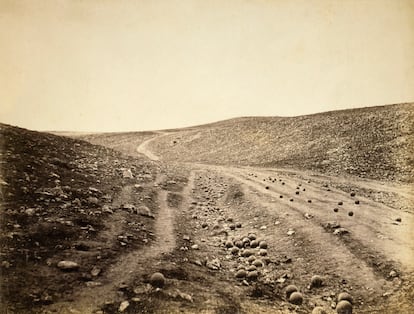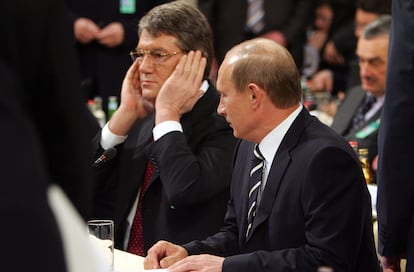In the conflict with Ukraine, Moscow is clinging on to the excuses of the past
British-German historian Orlando Figes, who is an expert in Russia, reviews the historical keys that explain the standoff that Putin is engaged in with the West, using the neighboring country as a battlefield

After last week’s “frank” but frosty meeting with Sergei Lavrov, the Russian foreign minister, Antony Blinken, the US secretary of state, gave his downbeat assessment on his efforts to restrain the Kremlin’s aggression against Ukraine. “I think the charitable interpretation would be that sometimes we and Russia have different interpretations of history,” Blinken said, and he is surely right, for history, as much as anything, is at the heart of this conflict.
Blinken and his Russian counterpart spent a large part of that meeting arguing about the history of 1989-91, in particular the meaning of a single sentence spoken by James Baker, Blinken’s predecessor as secretary of state, to Mikhail Gorbachev in February 1990, three months after the fall of the Berlin Wall, in an effort to persuade him to accept the reunification of Germany. Baker asked the Soviet president whether he would prefer to see an independent Germany, outside NATO, or one inside it “with assurances that NATO’s jurisdiction would not shift one inch eastward from its present position?”
When the Berlin Wall came down, Putin was a KGB agent in East Germany. None of the democratic spirit of these years affected him
It was no more than a suggestion, not a promise or a guarantee, according to the Americans. But the subsequent expansion of NATO into the countries of the former Warsaw Pact was seen by the Kremlin as a betrayal of this “international agreement.” Whatever the reality of what was meant by Baker’s words, Putin’s version of this broken promise has since festered as an idée fixe, a source of grievance and resentment of the West, which has fuelled his foreign policy and anti-Western nationalism. Just last December, at his annual press conference, he made his feelings clear: “‘Not one inch to the East,’ they told us in the nineties. And what happened? They cheated, tricked us brazenly!”
When the Berlin Wall came down, Putin was a KGB agent in East Germany. None of the democratic spirit of these years affected him. He experienced the collapse of the Soviet Union as a humiliation for his motherland, the “greatest geopolitical catastrophe of the 20th century,” as he later described it, in which “tens of millions” of Russians “found themselves outside the territory of Russia,” in Ukraine, the Baltic states and Kazakhstan.
In his version of this history, Russia’s chronic weakness in the 1990s was exploited by the West. The US and its North Atlantic allies acted as if the Cold War had been “won” by them, and that Russia, the “defeated” power, need not be consulted on the consequences of the Soviet collapse in regions where the Russians had historic interests and sensitivities.

The first real sign of this US-dominated world order, as the Kremlin saw it, was NATO’s unilateral intervention on the side of the Kosovan Albanians in their war for independence against Serbia, Russia’s oldest Balkan ally, during 1999. Dismissing NATO’s claims that it had intervened to prevent the ethnic cleansing of Albanians by the Serbian Milošević regime, Moscow accused NATO of expansionist ambitions in the Balkans, which it saw as its own “sphere of influence.” The idea of Russia’s Balkan mission is easily dismissed as an imperial and Pan-Slav myth, but it has shaped the Kremlin’s policies. NATO’s intervention would be used, moreover, by Moscow to justify its wars in Georgia in 2008 (when Russian forces occupied Abkhazia and South Ossetia to put an end to Georgia’s NATO hopes) and in Ukraine, beginning with the 2014 annexation of Crimea and its intervention in the Donbas and Luhansk, where pro-Russian separatists were supported by Moscow.
The real rupture with the West came with NATO’s eastward expansion and more general Western support for the democratic “colour” revolutions in Georgia and Ukraine in 2003-4, actions raising Putin’s fears of a democratic challenge to his own dictatorship in Russia. The West’s growing influence in Russia’s borderlands also touched a deeper nerve in that country’s historical consciousness: its age-old terror of encirclement by foreign powers bent on its dismemberment.
From the 16th century, Russia grew as an empire on the flat Eurasian land mass, which had no natural boundaries, no seas or mountain ranges, to protect it from foreign invasion or the influence of bordering states. At various moments in its history, Russia was invaded by the Poles and Lithuanians, the Swedes, the French, the British and the Germans, not to mention the 14 Allied powers that sought to overturn the Soviet regime between 1917 and 1921, all with plans to divide its empire into smaller territories.

Ukraine was particularly vulnerable to foreign invasion. It was a borderland between the Russian Empire and the West (its name derives from the Russian word “okraina,” meaning “periphery” or “borderland”) and had strong historical connections to the Polish-Lithuanian Commonwealth and the Ottoman Empire. Ukraine also served as a conduit for Western ideas and culture in Russia, an influence that made it valuable but dangerous to the Russian autocratic state. Separating Ukraine from Russia – the Germans’ top priority in both world wars – was the best and only way of destroying Russia as a “great power.”
On coming into office, in 2000, Putin’s aim was to restore Russia as a “great power” by rebuilding the state economy and challenging the “unipolar world” dominated by America. Renationalising the oil and media companies of the oligarchs, who had built their fortunes in the corrupt legal chaos of the Yeltsin years, the Putin government amassed a huge war-chest of foreign currency reserves from export sales of gas and oil. By 2007 these capital reserves were among the largest in the world. They enabled him to pursue a more assertive foreign policy while at the same time maintaining an acceptable standard of living for the bulk of the Russian population, which was used to tightening its belts for “patriotic” purposes.
Putin set out his agenda in a blistering attack on US global domination at the annual Munich Security Conference on February 10, 2007. NATO’s eastward expansion was “a serious provocation” against Russia, which would no longer play by the old international rules in furthering its interests. From this point Putin spoke increasingly of the West’s “Russophobia,” of its “double-standards” and “hypocrisy,” and the “disrespect” that it showed to Russia by not recognising its concerns.
Much of this was rooted in the rhetoric of the 19th-century Pan-Slav nationalists, whose anti-Western ideology was based on the myth of the “Russian soul” and its “spiritual values” as a counterpoint to the materialism of the West. Their anti-Westernism had been reinforced by a profound sense of injustice at the way that Russia had been treated by the West during the Crimean War (1853-56). The anti-Russian Anglo-French alliance, they argued in a manner that today will sound familiar, had pursued their own imperial interests, cloaked in the pretence of defending “liberty” against Russian aggression, by siding with the Turks against Russia. In an act of armed diplomacy similar to Putin’s in Ukraine today, Tsar Nicholas 1 had amassed his troops in Turkey’s Balkan territories to force the sultan to promote Russia’s interests in the Black Sea and the Holy Lands, where the Orthodox were at war with the French-backed Catholics over access to the Holy Places. After Russia’s defeat in the Crimea, when the Western powers subjected it to a humiliating peace, pan-Slav thinkers began to argue that the West was an existential threat to Russia’s Orthodox civilisation. “Europe,” argued Nikolai Danilevsky in 1869, “is not only alien to us but even hostile; its interests cannot be the same as ours, and in most cases they will be opposed to ours.”

Putin built on these ideas in his concept of the “Russian world” (Russkii mir), a concept he attached to the defence of “traditional Russian values” within the borders of the former Soviet Union. The “Russian world” idea had been advanced by the patriarch of the Orthodox Church to promote its spiritual inheritance from Kievan Rus, a link broken by the independence of Ukraine; but it was seized on by Putin, who used it as an arm of his foreign policy from 2012. The “Russian world,” he said, was a “family” of Slavs, the Russians, the Ukrainians and the Belarusians, who shared a common history, religion, language and cultural inheritance from Kievan Rus, the first “Russian” state, between the ninth and 13th centuries. This was the flimsy historical basis on which Putin justified his interventions in Ukraine and Belarus. He did not think of them as real and sovereign countries but as junior members of the “Russian world.”
Ukraine was the battlefield for this “clash of civilisations” (as Putin himself put it) between Russia and the West. The country was historically divided between its western regions, which had been part of the Polish-Lithuanian Commonwealth and then the Austrian-Hungarian Empire, where Ukrainian is widely spoken, and the eastern regions of Ukraine, where Russian was the dominant language. After 1991 no Ukrainian government could take the country too close to Russia or the West without risking civil war.
The balance was upset by two events. The first was Putin’s long-term plan, which gained momentum after 2012, to include Ukraine in a Eurasian Economic Union with Russia, Belarus and Kazakhstan. Putin envisaged the Eurasian Union one day growing into something like the European Union under Russia’s leadership – a Eurasian bloc to counteract the West. The second was the Maidan Revolution of 2013-14, a popular uprising against the pro-Russian Yanukovich government after it had pulled out of negotiations for an Association Agreement with the EU.
The Kremlin saw the revolution as an illegal coup by the opposition parties aided and abetted by the West. Its media outlets constantly referred to the nationalist Ukrainian government that replaced Yanukovich as a “junta” backed by “neo-Nazis” and “fascists,” a crude propaganda tactic to appeal to Russian nationalist feelings rooted in the memory of the war when some Ukrainians had collaborated with the Germans. Moscow accused Kyiv of threatening “genocide” against the Russians in Ukraine (an alarmist claim based on an ill-judged decision by the parliament in Kyiv to repeal a law protecting Russian and other minority languages). The Kremlin’s version of events was readily believed by the mainly Russian-speakers of the Donbas and Crimea, whose annexation would be justified by Russia’s historic duty to protect their rights.
When Khrushev gifted the Crimea to Ukraine in 1954 no one gave it much significance
Throughout this war, which has now rumbled on for eight years, Putin has insisted that the Russians have been fighting not so much against Ukraine itself as against the West, in the form of NATO, on Ukrainian soil. In July of last year he wrote a long article arguing that Ukraine, historically a brother of Russia, had been turned by its nationalist leaders and the Western powers arming them into Russia’s enemy. His tone was militant:
“The most despicable thing is that the Russians in Ukraine are being forced not only to deny their roots, generations of their ancestors but also to believe that Russia is their enemy. It would not be an exaggeration to say that the path of forced assimilation, the formation of an ethnically pure Ukrainian state, aggressive towards Russia, is comparable in its consequences to the use of weapons of mass destruction against us.”
This is why, in his own mind, he has amassed his troops on Ukraine’s borders – to occupy the Donbas, if need be, before it is reclaimed by Kyiv’s forces, armed and encouraged by NATO. Only by securing its autonomy through the Minsk Accords, or by keeping the Donbas in a state of frozen conflict, can the Kremlin hope to stop Ukraine from joining NATO or the EU in its present form.
The Minsk Accords remain the best and only hope of resolving this crisis without a larger war. It would mean the demilitarization of the eastern regions, which would gain autonomy within a decentralised but sovereign Ukraine. Little progress has been made in the stop-start talks of the last seven years, and Putin has become increasingly frustrated by the uncompromising attitude of the Zelensky government, which, under pressure from its nationalist base, now sees any agreement in a form acceptable to Russia as an act of treason against Ukraine. That is the reason for Putin’s troop build-up on the Ukrainian border: it is a show of strength, an act of armed diplomacy, to put pressure on Ukraine.
None of this had mattered in the Soviet Union, where Russia and Ukraine had been republics in a multi-national federation where boundaries were artificial constructions. When Nikita Khrushev gifted the Crimea to Ukraine in 1954 to celebrate the tercentenary of the union between Russia and Ukraine no one gave it much significance. Today the USSR is a distant memory. The ties between the Russians and Ukrainians, which had united families, communities and industries, have worn thin, and in the hands of nationalist leaders on both sides, the boundaries between them have become the markers of an ethnic conflict, a fight for blood and soil, threatening to become a full-scale war.
Orlando Figes is a historian and writer of books such as ‘A People’s Tragedy,’ ‘Natasha’s Dance’ and ‘The Europeans.’
Tu suscripción se está usando en otro dispositivo
¿Quieres añadir otro usuario a tu suscripción?
Si continúas leyendo en este dispositivo, no se podrá leer en el otro.
FlechaTu suscripción se está usando en otro dispositivo y solo puedes acceder a EL PAÍS desde un dispositivo a la vez.
Si quieres compartir tu cuenta, cambia tu suscripción a la modalidad Premium, así podrás añadir otro usuario. Cada uno accederá con su propia cuenta de email, lo que os permitirá personalizar vuestra experiencia en EL PAÍS.
¿Tienes una suscripción de empresa? Accede aquí para contratar más cuentas.
En el caso de no saber quién está usando tu cuenta, te recomendamos cambiar tu contraseña aquí.
Si decides continuar compartiendo tu cuenta, este mensaje se mostrará en tu dispositivo y en el de la otra persona que está usando tu cuenta de forma indefinida, afectando a tu experiencia de lectura. Puedes consultar aquí los términos y condiciones de la suscripción digital.








































